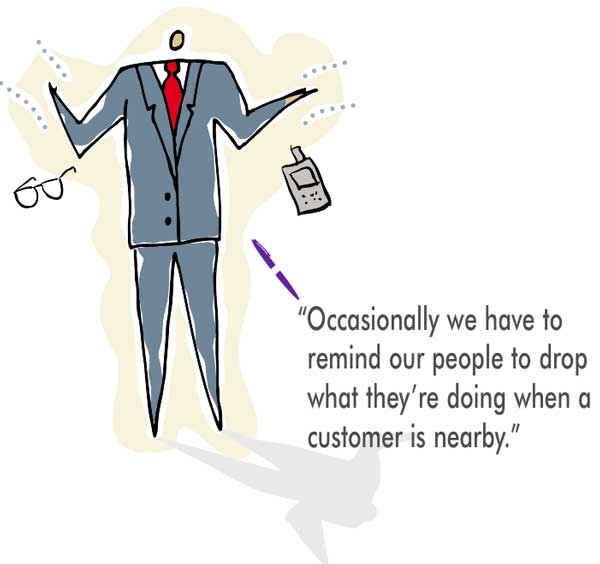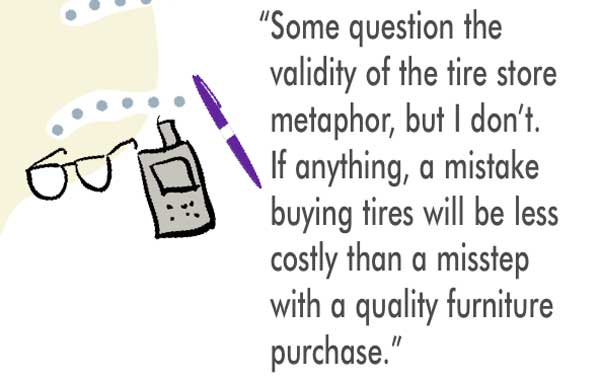In 1948, my parents, Max and Edna Schneiderman, bought a small, broken-down general store in the rural township of Elmer, Minnesota, about 45 miles northwest of Duluth, in an area of the state known as the Iron Range.
From the humble beginnings of an ill-stocked general store, retailer Schneiderman’s Furniture has grown to include six large stores in the Minnesota cities of Duluth, Lakeville, Roseville, Woodbury, Plymouth, and Rochester.
I sold my first piece of furniture in my parents’ store when I was 15 years old and I’ve been hooked ever since.
Over the years I collected some instructive stories I decided to share with other furniture retailers in the just published book, “Call of the Couch”. As a long time reader and fan of Furniture World magazine, I am also sharing some of these insights in this short series of articles.

What Dad Taught Me About Mentoring
When I talk about my dad in today’s world, it may sound like he was rude. It was so different back then. There were so many things he did, or said, that I wouldn’t even consider. For example, my dad hated to sell carpeting. Selling carpeting could be tedious, and really, the customer was dependent on the salesperson for help. Added to that, a lot of it looks alike. So, it’s time-consuming. My mother would be the first to assist a carpet customer. If she was busy with another customer, then I would work with the carpet customer.
Eventually my wife, Sheila, started working at Schneiderman’s and she was good at selling carpeting. Well, one Sunday we had three customers and they were all interested in carpet. So, here we all are in this small, confined carpet area. We are all showing samples.
My dad’s customer says to him in a loud voice, obviously wanting the other customers to hear it, “I can buy this same carpet for $2 a yard less at Goldfine’s.”
My dad looked at him, took a $20 bill out of his wallet, laid it on the table, and said, “I’ll bet you that you can’t find that carpet for $2 a yard less at Goldfine’s.”
The guy said, “I don’t want to bet.”
Dad puts another $20 down on the table and said, “I bet you can’t find this carpet for $1 a yard less at Goldfine’s.”
The guy said again, “I don’t want to bet.”
So Dad puts another $20 down, and he said, “I tell you what. I think you and I both know you won’t buy any carpeting from me today. I’ll bet you $100,” he says as he puts two more twenties down, “that you can’t buy this carpet for the same price at Goldfine’s as you can buy it here.”
The guy said, “I don’t have $100.”
“Then you don’t have any goddamn business looking at carpet.” Dad made this bold statement while he was scooping up his five twenties, and the couple took off.
Dad, Mom, and I would often visit about the day on Sunday nights as we closed. That night, my dad asked me, “You were embarrassed by that, weren’t you?”I said I was.
And then my mother said to me, “I sold to my customer and you sold to your customer because your father made the point.” That was true, even though he would never have wanted to see me do what he did that day, and I would never act that way toward a customer or allow a sales consultant to do so.
Looking back, I believe that his purpose was greater than just making a couple of sales. He was acting as a mentor to me in a way that was memorable.
At Schneiderman’s today, we often hire people who have little sales experience. They appear to have the aptitude for it, but they don’t really know whether or not they’re going to like it—or whether or not they’ll do well. They have a lot of preconceived notions about selling.
Many furniture retailers put salespeople out on the floor with little training or ongoing mentoring. That’s a shame, because without that, they can’t build confidence to be comfortable with their store, it’s policies, products and services. So confident, in fact, that they would be willing to bet $100 that their customer could not find a better value elsewhere.
The Eight-Foot Rule
The eight-foot rule is to never let a shopper pass within eight feet without smiling and welcoming. Here’s its sidekick: Never fail to look up and acknowledge your shopper as she moves near you. If you’re on the phone or gazing at a computer screen, stop, look up, and smile. Stop, look, and listen. It’s the safest way to happy customers.
Smile Every Time:
I am impressed when I’m at a business where the employees appear to be happy. Recently, six of us had brunch at the BLVD Kitchen in Minnetonka on an Easter Sunday. Whoever hires people there has my admiration. To a person, they smiled, were helpful, and as I commented to my daughter-in-law, Natalie, they all exuded an attitude of, “I sure am glad to be working my butt off on Easter Sunday.”
Likewise, our employees should be thankful for the customers who come to our stores, whether we’re working with them or not. There’s a lot of stress and unpleasantness in the world; let our place be a respite.
Don’t walk by a customer or anyone without a welcoming smile, whether that smile is returned or not.

Drop Everything:
Occasionally we have to remind our people to drop what they’re doing when a customer is nearby. We need to acknowledge people, show them we know they’re important. Customers sometimes signal their desire to be left alone by looking the other way and avoiding eye contact. Still, maintain the habit of smiling and saying “hello” because we at retail are charged with making their experience a good one.
Some call it “the close”
Some call it the close, but I call it gathering evidence and calling for the verdict. My friends know I’m always up for a good meal. Casual? Fast food? Formal? Steak? Seafood? Once we gain a consensus, I always appreciate the friend who steps out and calls us into action. I want to eat. I don’t want to discuss every variable of eating out. So it is with our customers. Once the right item has been found and any objections answered, it’s a kindness to help a customer finalize her choice.
Jumping The Gun:
In selling circles, it is a common perception that to be a great sales consultant, you must be a great closer. That is true, but a lot of damage can be caused by prematurely suggesting a customer should buy something. When a sales consultant hasn’t asked the right questions to understand the needs and then tries to push the customer into buying something he or she doesn’t need, that action is likely to remove any trust. In this case, the sales consultant confirms the worst thoughts people have about pushy salespeople. It damages the store’s reputation and it reflects poorly on the vocation.
It is far better to view the process step by step, offer suggestions, answer objections honestly, and then only when you feel the customer is in agreement, ask for the sales order. Paul Zimmerman, our long-time sales and operations manager, has noticed that we get far more complaints from customers who felt we weren’t helpful enough, rather than we were pushy. It’s worth remembering that customers want to find solutions and they need our help.
Are You Like A Tire Store?
We will sometimes have sales consultants who voice the opinion that they think customers should be left to browse. When we hear this unfortunate view surface, we drag out our “tire store” comparison. Imagine you need to buy a set of tires for your car. Upon entering, you’re greeted by a pleasant salesperson, who says, “Go ahead and browse around at our tires.” Okay, now what? Wouldn’t it be far more helpful and effective if the sales- person asked some questions like: What kind of car are these for? What happened with the tires you have now? What is your main concern? Is it safety? Is it price? How many do you need?
Some question the validity of the tire store metaphor, but I don’t. If anything, a mistake buying tires will be less costly than a misstep with a quality furniture purchase.
The Ideal Sales Consultant:
A disadvantage of the big furniture stores, including ours, is that it’s easy to lose a customer in the showroom. We’ve sponsored focus groups and we’ve asked the question, “What is the ideal sales consultant?” The comparison that has often come up is that the sales consultant should be like a great server in a good restaurant, out of sight until you need them. That’s easy to say, not so easy to execute. Not too long ago, I visited El Dorado Furniture in Miami and was impressed to notice that their salespeople are required to not only stay available to customers, but to escort them out the door—every time. While I waited for a cab to pick me up, I counted customers leaving, and every single one of them was with a salesperson as they left.
I’ll Know It When I See It:
One of the more common things customers sometimes say as they’re browsing the showroom is, “I’ll know it when I see it.” I have pondered how a shopper will know it when they see it when, in reality, they don’t really know what they need. One of our top sales consultants told me how he works on this “secret.” He listens to what the customer says and then asks permission to show them an item. If it doesn’t fill the customer’s need, he asks, “What should be changed to make this work?” Then they work on it from there. Often the customer leaves happy, having found what she had in mind. I told you he is one of our best.
Next Issue
More tips and retail stories from Larry Schneiderman.
Editor’s Note: If you have retail stories to share, please send them to Furniture World Magazine at
russ@furninfo.com.
Larry Schneiderman is the CEO of the six-store Minnesota-based retailer Schneiderman’s Furniture. He sold his first piece of furniture when he was fifteen and has been hooked ever since. Don’t ask him when he’s going to retire—they don’t have a treatment facility equipped for his kind of customer-service addiction. He is the author of the recently published book, “Call Of The Couch: A Family’s Love Affair With It’s Business.” Says Brian Tracy, the best-selling author, entrepreneur, and business development consultant, “This book tells a memorable and rich story of success in business, lessons learned, and the wisdom that every person can apply.”
Comments about this article or questions can be addressed to www.larryschneiderman.com.
Offer for Furniture World Readers: Larry’s book is available for sale through www.larryschneiderman.com with a $5 off coupon for Furniture World Readers.